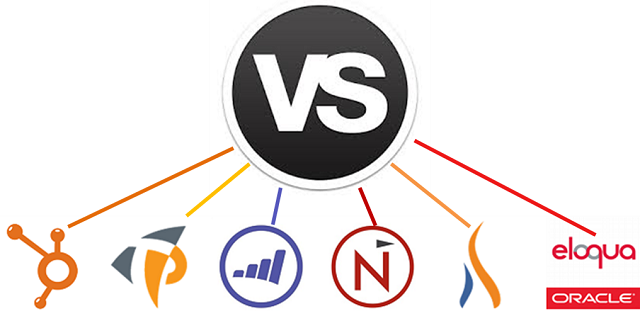
Marketing Automation Software Comparison/Reviews:
Looking for a handy way to review and compare the most popular marketing automation software platforms? The best marketing automation software incorporates many of the same elements; List building, CRM integration and Email/Drip campaigns just to name a few. How smoothly and how tightly incorporated the elements are will cause one software to be “better” than another. Building landing pages, reporting on analytics and executing campaigns is another very important comparison point when reviewing potential marketing automation software.
Because marketing automation platforms are usually tailored to a certain sized business (i.e. HubSpot deals primarily with small businesses, while Eloqua is almost exclusively used at the enterprise level), it is wise to choose a platform carefully. To help out with the review process, we’ve drafted up a white paper and most importantly a handy chart (cheat sheet) to compare automation platforms.
Automation Software Comparisons in Downloadable White Paper:
- Cost of Marketing Automation Software
- Does the software have a cost per contact?
- List of CRM Integration Capabilities (does the software connect to your customer database?)
- Typical Size-of-company Each Platform Typically Supports
- Campaign Execution Features
- Landing Page Builders
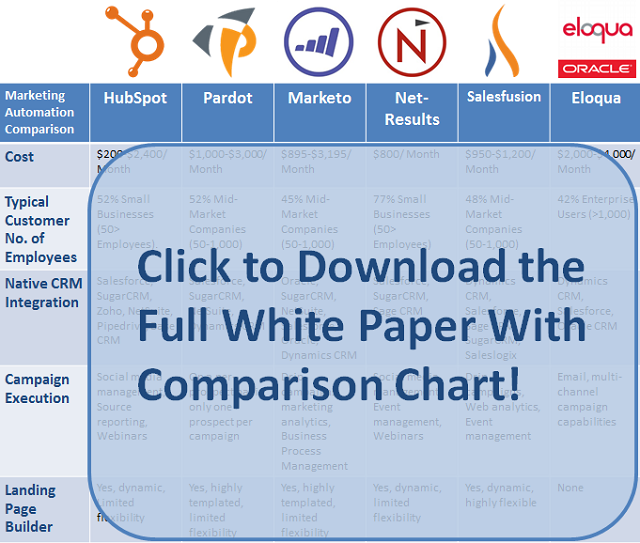
What is the best online/cloud-based CRM software? Here at Softwarefit, we streamline the review process so you can find the CRM that suits your business needs and get back to what is important – your business! We base our reviews on what real people are saying and publish informative white papers.
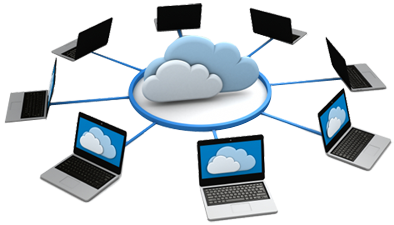
What does cloud-based mean? – Cloud-based means that the CRM software and it’s data is stored online. Most CRM companies are very secure, but it is important that you work with a trusted CRM partner. Most CRM vendors provide a value-added service greater than what the actual software company itself can provide. Most CRMs on the market are cloud-based.
Cloud-based vs On-Premise – If you’re still confused about weather to host online or on-premise, read this relative article, “Cloud-based vs. On-Premise ERP“. Even though this article is in regard to ERP, it contains many of the same themes.
Cost difference of cloud-based – By now you’ve figured out that cloud-based software is often much cheaper than on-premise. Because of legality issues, some industries (such as healthcare) may be required to host their data on premise, but most are in the cloud.
The price point – Between cloud-based crm software varies drastically, making an online model the more economical choice for smaller businesses. There is a CRM for every budget and our white paper will go into details on the pricing breakdown.
Download our complimentary white paper for a complete CRM comparison which will compare and contrast the market leaders in customer relationship management both on the cloud and on-premise.
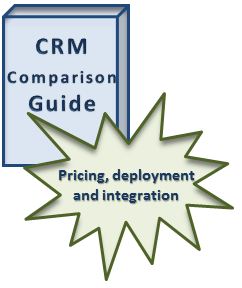
Integrating marketing automation into your CRM has become an integral part of business success. Combine strong marketing automation with a customer relationship management powerhouse and you have a winning mix.
By integrating a top quality CRM with a marketing automation platform, businesses are able to definitely measure the quality of leads coming in and properly disperse them to the appropriate people.

Not only will marketing automation system that integrates with a CRM make your business more effective, it will make it more efficient as well. The right combination can increase productivity and ensure that your sales team is working smarter, not harder.
We have compiled a chart of market leaders in both marketing automation and customer relationship management to help you determine what which solutions are the right ones for you and your business. Click here to download the free white paper.

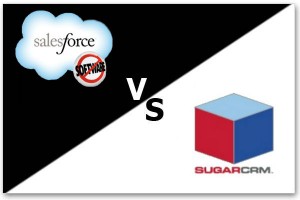
When faced with reviewing SugarCRM vs. Salesforce, it can be a daunting comparison task to determine which one is the right choice for your individual needs. The debate about which product is superior, SugarCRM or Salesforce, has been a constant one in the CRM industry.
To help you better determine which product will be the best fit with your business, we have written a brief white paper with comparison chart of the two.
Overview
The most important part of any business is the customer. How a business manages said customer can be the defining factor that makes or breaks an enterprise. Customer relationship management (CRM) software is an integral part of the success of any customer-based business. The particulars will vary from software to software, but some key elements remain the same – data management, customer tracking, workflow automation and reporting are all key functions to a top CRM.
Pricing
SugarCRM is one of the fastest growing and most cutting edge products on the market. It is available in four different editions beginning at $35 per user per month for Sage Professional and topping out at $100 per user per month for Sugar Ultimate.
Salesforce is available in five different editions and offers affordable options for any size of business. Contact Manager, the most inexpensive option, begins at $5 per user per month and the top tier option, Performance, hits at $300 per user per month.
Features
Each edition of Sugar includes on-premise or cloud deployment, scheduled data backups, social media integrations and mobile device accessibility. Many of the upper level features can be selected ala-carte as optional upgrades such as Sugar Mobile Plus along with Phone and Developer Support. The SugarCRM experience is one that is as individual as each business and offers value for the cost.
Salesforce has been a major player in the CRM industry for over 15 years. With that wealth of experience brings some exclusive features such as Sales Cloud and App Exchange as well as the Service Cloud. Salesforce does hit on the higher end of the price scale but it does have a strong reputation and continues to innovate in the industry.
To learn more, check out our in-depth white page comparison here.







